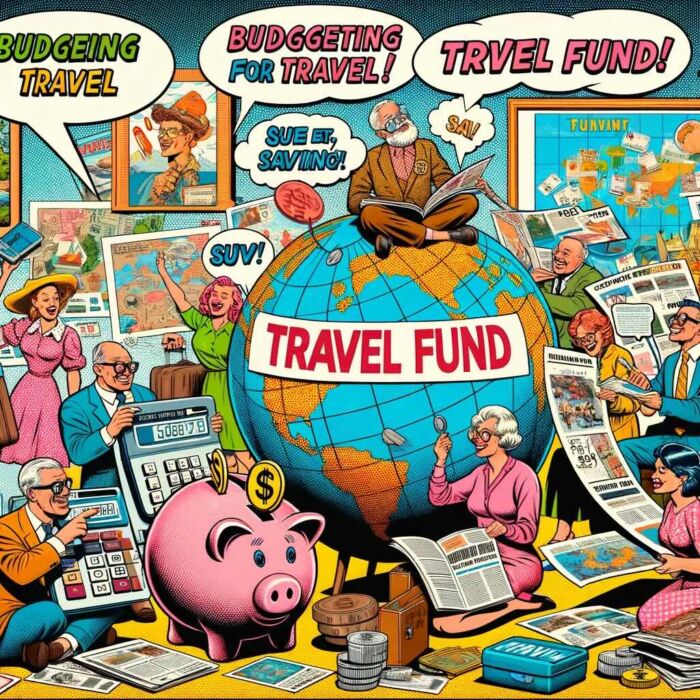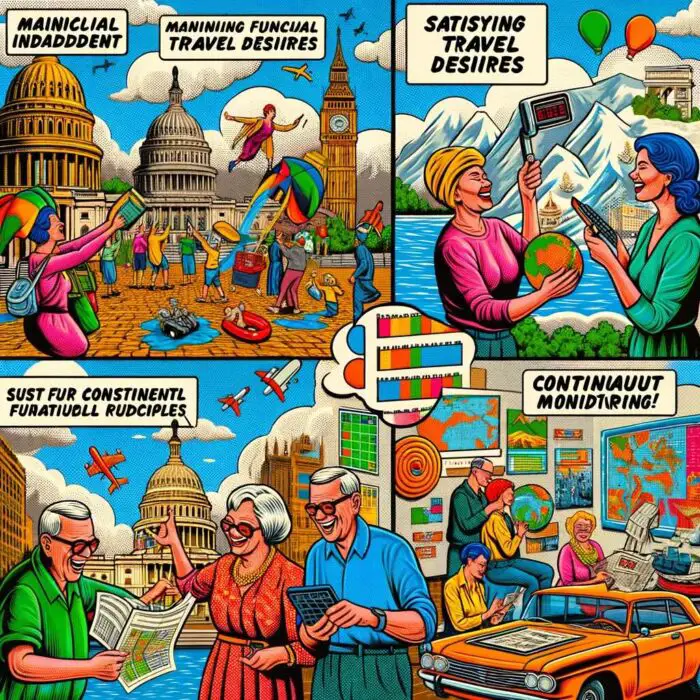The FIRE (Financial Independence, Retire Early) movement has gained significant traction in recent years, captivating the imaginations of individuals who seek financial freedom and the flexibility to retire at an earlier age. At its core, FIRE is about saving and investing aggressively to accumulate enough wealth to sustain a desired lifestyle without relying on traditional employment.

FIRE enthusiasts adopt a frugal and minimalist approach to life, prioritizing financial independence over material possessions. By diligently saving a large portion of their income and adopting a strategic investment strategy, adherents of the movement aim to build a substantial nest egg that generates passive income to cover their expenses.

Traveling post-retirement under FIRE
One of the most exciting aspects of achieving financial independence and early retirement is the ability to embark on long-awaited adventures and explore the world. Traveling post-retirement under the FIRE philosophy offers an opportunity to indulge in newfound freedom and immerse oneself in diverse cultures, breathtaking landscapes, and unforgettable experiences.
While traditional retirement often conjures images of relaxation and leisure, FIRE retirees view retirement as an open invitation to pursue passions, including extensive travel. By embracing a mindful and budget-conscious approach, individuals who have reached financial independence can make the most of their retirement years and create unforgettable memories.
Careful planning and budgeting for travel
Traveling the world after retirement on a FIRE-inspired budget requires careful planning and meticulous budgeting. While it may be tempting to throw caution to the wind and splurge on lavish trips, adhering to the principles of financial independence remains paramount. The key is to strike a balance between cost-effective exploration and meaningful experiences.
By employing strategic money-saving tactics and being resourceful, retirees on FIRE can stretch their travel budget further while still enjoying an authentic and immersive experience. This might involve seeking affordable accommodation options, researching economical transportation alternatives, and embracing the local culture to discover hidden gems that don’t break the bank.
Approaching travel with a careful and detail-oriented mindset doesn’t dampen the spirit of adventure; rather, it enhances the overall experience. It allows retirees to appreciate the journey as much as the destination and provides a sense of accomplishment by making the most of their hard-earned financial independence.
In the following sections, we will delve into practical tips and strategies to help you navigate the world of affordable exploration after retirement within the framework of the FIRE movement. Whether you dream of trekking through remote mountains, strolling along pristine beaches, or immersing yourself in bustling city streets, we will equip you with the knowledge and tools to make your dreams a reality while staying true to the principles of financial independence.

Understanding the Desire to Travel Post-Retirement
Common desire to travel post-retirement
The desire to travel post-retirement is a common aspiration shared by many individuals who have reached financial independence through the FIRE movement. After years of diligently saving and investing, retirees on FIRE find themselves in a unique position to explore the world and satisfy their wanderlust.
Traveling allows retirees to break free from the monotony of everyday life and embark on new adventures. It offers an opportunity to immerse oneself in different cultures, broaden horizons, and create lifelong memories. The freedom that comes with financial independence enables retirees to design their itineraries and indulge in experiences that align with their interests and passions.
For many, travel is not merely a leisurely pursuit but a transformative experience. It provides an opportunity for personal growth, self-discovery, and the development of a broader perspective. Exploring diverse landscapes, engaging with local communities, and experiencing different ways of life can foster a deep appreciation for the world’s richness and diversity.

Benefits and challenges of travel during retirement
Traveling post-retirement under the FIRE philosophy offers numerous benefits, but it also presents its fair share of challenges. Understanding and addressing these challenges is essential for a successful and fulfilling travel experience.
Benefits:
- Time and Flexibility: Retirement frees individuals from the constraints of a 9-to-5 job, allowing for more extended travel periods and the flexibility to adjust plans as desired.
- Deeper Immersion: Unlike shorter vacations, post-retirement travel allows for a more immersive experience, enabling retirees to spend more time in a destination and truly absorb its culture and way of life.
- Enhanced Health and Well-being: Traveling can positively impact physical and mental well-being, promoting relaxation, stress reduction, and overall happiness.
- Social Connections: Engaging with fellow travelers and locals provides an opportunity to forge new friendships, broaden networks, and foster meaningful connections.
Challenges:
- Financial Considerations: While FIRE retirees have achieved financial independence, it’s crucial to ensure that travel expenses align with their budget and long-term financial goals.
- Health and Safety: As retirees age, health considerations become more significant. It’s essential to factor in medical insurance, necessary vaccinations, and access to healthcare services in destinations.
- Planning and Logistics: Extensive travel requires careful planning, research, and organization to maximize the experience and minimize potential pitfalls.
- Leaving Comfort Zones: Stepping outside familiar surroundings can be both exhilarating and daunting. Embracing new cultures, languages, and environments requires adaptability and an open mind.
Case studies of individuals who have successfully traveled post-retirement while on FIRE
- Sarah and Mark: Sarah and Mark are a retired couple who achieved financial independence through the FIRE movement. They dedicated years to saving and investing, with a dream of exploring the world together. By carefully budgeting their expenses and prioritizing travel, they were able to embark on a multi-year journey, visiting various continents and immersing themselves in local cultures. They utilized cost-effective accommodation options, such as house-sitting and home exchanges, to keep their lodging expenses low. Through meticulous planning and flexibility, they successfully navigated diverse destinations, experiencing the joys of travel while remaining true to their FIRE principles.
- David: David, a single retiree on FIRE, had always dreamed of trekking through remote mountain ranges across the globe. With his financial independence, he was able to pursue this passion post-retirement. David strategically planned his trips during off-peak seasons, taking advantage of lower travel costs and fewer crowds. He joined trekking groups and utilized local guides to ensure safety and make the most of his experience. By aligning his passion for exploration with his financial goals, David created a fulfilling and adventurous retirement filled with breathtaking landscapes and memorable encounters.
These case studies illustrate that it is indeed possible to travel the world post-retirement while adhering to the principles of the FIRE movement. With careful planning, resourcefulness, and a commitment to financial independence, individuals can embark on transformative journeys, enrich their lives, and fulfill their travel aspirations.
source: Playing with FIRE on YouTube
Key Considerations for Travel in Retirement
Budgeting and saving for travel during the FIRE journey

Budgeting and saving for travel are integral components of the FIRE journey, especially when it comes to post-retirement exploration. While achieving financial independence is a significant milestone, it’s crucial to allocate funds specifically for travel expenses to ensure sustainable and fulfilling adventures.
- Establish Travel Budget: Begin by determining how much you can comfortably allocate to travel each year. Consider your overall retirement budget, including living expenses, healthcare costs, and other financial commitments.
- Prioritize Travel Savings: Set aside a portion of your income explicitly designated for travel. Treat it as a non-negotiable expense, just like any other essential financial obligation.
- Embrace Frugality: Apply the principles of frugality and minimalism to your travel plans. Seek affordable alternatives for transportation, accommodation, and dining. Look for deals, discounts, and rewards programs that can help stretch your travel budget further.
- Long-Term Travel Planning: If you have long-term travel goals, consider breaking them down into shorter trips. This approach allows you to budget for each adventure individually and maintain a sustainable travel fund throughout your retirement years.
Potential costs involved in travel and how to plan for them
Understanding the potential costs associated with travel is crucial for effective financial planning. By considering these expenses and incorporating them into your overall retirement budget, you can avoid financial surprises and ensure a smooth and enjoyable travel experience.
- Transportation Costs: Research and compare various transportation options to find the most cost-effective solution. Consider utilizing frequent flyer miles, travel rewards, or alternative modes of transportation such as trains or buses.
- Accommodation Expenses: Explore affordable accommodation options such as budget hotels, hostels, vacation rentals, or even house-sitting opportunities. Platforms like Airbnb and Couchsurfing can provide access to budget-friendly lodging choices.
- Food and Dining: Set a daily or weekly food budget to control your dining expenses. Embrace local cuisine and street food to experience authentic flavors at lower costs. Consider self-catering options for some meals to save money.
- Activities and Sightseeing: Research and prioritize the activities and attractions that align with your interests. Look for free or discounted options, such as city passes or museum discounts for retirees. Take advantage of local guides or free walking tours to gain insights into the destination without incurring high costs.
- Currency Exchange and Transaction Fees: Be mindful of currency exchange rates and transaction fees. Consider using no-fee or low-fee credit cards or pre-paid travel cards that offer favorable exchange rates.
Understanding healthcare and insurance needs while traveling
Maintaining good health and ensuring appropriate insurance coverage are essential aspects of travel, particularly during retirement. Here are key considerations:
- Travel Insurance: Invest in comprehensive travel insurance that covers medical emergencies, trip cancellation, and lost belongings. Ensure the policy includes coverage for pre-existing medical conditions and activities specific to your travel plans.
- Medical Considerations: Before traveling, consult with your healthcare provider to ensure you’re in good health for the journey. Obtain necessary vaccinations and medications based on your destinations. Research healthcare facilities and emergency services available in the countries you plan to visit.
- Medicare Coverage: If you’re a U.S. citizen, be aware that Medicare coverage may have limitations outside the country. Consider supplemental insurance or private travel medical insurance to bridge any gaps in coverage.
- Prescription Medications: Ensure you have an ample supply of prescription medications for the duration of your travels. Research local regulations regarding carrying medications across borders and carry necessary documentation to avoid any issues.
- Emergency Contacts: Carry a list of emergency contacts, including your healthcare provider’s information, emergency medical services in your destinations, and contact details of trusted individuals who can assist in case of emergencies.
By addressing healthcare and insurance needs proactively, you can travel with peace of mind, knowing that you’re prepared for unforeseen circumstances and can access necessary medical care if needed.
Remember, while careful planning and budgeting are essential, don’t let financial considerations overshadow the joy and spontaneity of travel. Find the right balance between cost-consciousness and embracing new experiences, allowing yourself to create unforgettable memories while staying true to your FIRE principles.
source: Cyn Meyer – Second Wind Movement on YouTube
Strategies for Affordable Travel in Retirement
Selecting cost-effective destinations
Choosing cost-effective destinations can significantly impact your travel budget during retirement. Here are some strategies to consider:
- Research Affordable Countries: Explore countries with a lower cost of living or favorable exchange rates. Southeast Asian countries like Thailand, Vietnam, or Cambodia, or Eastern European destinations like Poland or Hungary, often offer affordable options for accommodations, meals, and attractions.
- Off-the-Beaten-Path Locations: Consider less-touristy destinations that still offer unique experiences. Instead of popular capital cities, explore smaller towns or rural areas where prices are generally lower, and you can immerse yourself in local culture.
- Traveling in Regions with Shared Borders: Opt for destinations that share borders, allowing you to easily explore multiple countries without incurring high transportation costs. European countries or Southeast Asian nations are excellent examples of regions that facilitate affordable cross-border travel.
- Consider Long-Term Stays: Renting a property for an extended period, such as a few months or even a year, can often lead to significant cost savings compared to short-term stays. This option allows you to live like a local, build connections, and experience the destination more intimately.

Tips for budget-friendly accommodation, transportation, and dining
- Accommodation:
- Budget Hotels and Hostels: Look for affordable hotels and hostels that offer clean and comfortable accommodations without breaking the bank.
- Vacation Rentals: Platforms like Airbnb, Vrbo, or Booking.com provide a range of budget-friendly vacation rentals, allowing you to have more space and cooking facilities, potentially saving on dining expenses.
- House-Sitting and Home Exchanges: Consider opportunities to house-sit or engage in home exchanges, where you can stay in someone’s home in exchange for taking care of their property or swapping homes with another traveler.
- Transportation:
- Off-Peak Travel: Traveling during off-peak seasons can lead to substantial savings on flights and accommodations. Avoiding peak holiday periods and booking mid-week flights often offers better deals.
- Local Transportation: Utilize local transportation options like buses, trains, or shared taxis to explore your destination. These options are usually more budget-friendly compared to private transfers or renting a car.
- Walk and Cycle: When feasible, explore your destination on foot or by renting a bicycle. Not only does it save money, but it also allows you to experience the local ambiance and discover hidden gems.
- Dining:
- Street Food and Local Eateries: Explore local street food markets and small eateries to sample authentic cuisine at a fraction of the cost of upscale restaurants. These places often offer delicious and unique dishes that reflect the local culture.
- Self-Catering: Take advantage of self-catering options by shopping at local markets and preparing your meals. This approach allows you to experience local ingredients and flavors while saving money.
- Picnics and Lunch Specials: Opt for picnics in parks or enjoy lunch specials at restaurants, as they often offer more affordable menus compared to dinner options.
Utilizing rewards programs, travel hacks, and off-peak travel
- Rewards Programs: Sign up for travel rewards programs and credit cards that offer mileage points, hotel rewards, or cashback. Accumulate points through your regular expenses and use them to offset travel costs or upgrade your experiences.
- Travel Hacks:
- Fare Comparison Websites: Use fare comparison websites like Skyscanner or Kayak to find the best flight deals across multiple airlines. Be flexible with your travel dates and consider indirect flights or layovers to secure lower fares.
- All-Inclusive Packages: Explore all-inclusive packages that combine accommodation, flights, and meals. These packages can sometimes offer significant savings, especially for resort-style destinations.
- City Tourism Cards: Many cities offer tourism cards that provide discounted or free entry to popular attractions, public transportation, and additional perks. Research and consider purchasing these cards to save on sightseeing costs.
- Off-Peak Travel:
- Shoulder Seasons: Consider traveling during shoulder seasons, which are the periods just before or after the peak tourist season. You can enjoy milder weather, fewer crowds, and often lower prices on accommodations and attractions.
- Midweek and Non-Holiday Travel: Avoiding weekends and holiday periods when prices tend to be higher can lead to substantial savings on flights, accommodations, and attractions.
By employing these strategies, you can make your retirement travel experiences more affordable without compromising on the quality of your adventures. Remember to plan ahead, stay open to alternative options, and embrace the opportunity to discover new destinations and cultures within your budgetary constraints.
source: Retirement Travelers on YouTube
Balancing Travel Desires with FIRE Principles
Maintaining financial independence while satisfying travel desires

Traveling in retirement while adhering to FIRE principles requires a delicate balance between satisfying your wanderlust and maintaining financial independence. Here’s how you can achieve this equilibrium:
- Set Realistic Travel Budgets: Allocate a portion of your retirement budget specifically for travel. Determine a comfortable spending range that aligns with your long-term financial goals and desired travel experiences.
- Prioritize Meaningful Experiences: Focus on the quality of your travel experiences rather than the quantity. Instead of trying to visit every destination on your bucket list, prioritize those that truly resonate with your interests and passions. This approach allows you to allocate your travel budget more effectively.
- Embrace Frugal Travel Practices: Apply the principles of frugality and minimalism to your travel plans. Seek cost-effective accommodation, transportation, and dining options while still embracing the essence of each destination. By prioritizing experiences over material possessions, you can create meaningful memories without straining your finances.
- Continuously Monitor and Adjust: Regularly review your travel spending and assess its impact on your overall financial plan. Be prepared to make adjustments or compromises if necessary to maintain your desired level of financial independence.

Practical examples of maintaining the FIRE lifestyle while traveling
Maintaining the FIRE lifestyle while traveling is entirely feasible with some practical strategies and examples:
- Slow Travel: Embrace the concept of slow travel, where you spend more time in each destination, allowing you to experience the local culture deeply. This approach reduces transportation costs and gives you an opportunity to negotiate lower rates for long-term accommodations.
- Geoarbitrage: Take advantage of geoarbitrage by strategically choosing destinations with a lower cost of living. This allows you to stretch your travel budget further while still enjoying unique experiences. For instance, living in Southeast Asia or Eastern Europe can be significantly cheaper than Western countries.
- Side Hustles: Engage in side hustles or freelance work while traveling to supplement your income. The flexibility provided by FIRE allows you to pursue remote work opportunities or monetize your skills, helping to offset travel expenses.
- Volunteering and Work Exchanges: Consider participating in volunteer programs or work exchanges, where you provide your skills or labor in exchange for accommodation and sometimes meals. This allows you to experience a destination more intimately while significantly reducing costs.
Discussing the importance of adaptability and resilience in travel plans
Adaptability and resilience are essential qualities when it comes to travel, particularly in retirement and within the context of the FIRE movement. Here’s why they matter:
- Embrace Flexibility: Travel plans may not always go as expected. Flights get delayed, accommodations might fall through, or unforeseen circumstances arise. By embracing flexibility, you can navigate these challenges more easily and find alternative solutions without compromising your travel experience.
- Seize Opportunities: Stay open to unexpected opportunities that may arise during your travels. Sometimes the most memorable experiences are the ones that weren’t part of your initial plan. Be willing to deviate from your itinerary and seize unique opportunities as they present themselves.
- Adapt to Local Cultures: Embracing local customs and traditions fosters deeper connections with the places you visit. By adapting to local practices and norms, you not only respect the culture but also unlock hidden opportunities and potentially save money by engaging with local businesses and understanding their pricing structures.
- Learn from Setbacks: Traveling inevitably involves setbacks and challenges. It’s important to view these setbacks as learning experiences and opportunities for personal growth. Embracing resilience allows you to overcome obstacles, find solutions, and emerge stronger from the experience.
Remember, the beauty of travel lies not only in the destinations but also in the personal growth and self-discovery it offers. By striking a balance between fulfilling your travel desires and maintaining financial independence, while also cultivating adaptability and resilience, you can create a retirement filled with meaningful adventures while staying true to the principles of the FIRE movement.
source: Your Money, Your Wealth on YouTube
Preparing for the Unexpected

Importance of an emergency fund for unexpected travel costs
When traveling in retirement under the FIRE philosophy, it’s crucial to have an emergency fund specifically designated for unexpected travel costs. Here’s why it matters:
- Unforeseen Expenses: Despite careful planning, unforeseen expenses can arise during your travels. This could include medical emergencies, trip cancellations, lost or stolen belongings, or unexpected transportation costs. An emergency fund provides a financial buffer to handle these situations without derailing your overall travel budget.
- Peace of Mind: Knowing that you have a dedicated fund for unexpected travel expenses brings peace of mind. It allows you to handle emergencies confidently, knowing that you have the financial resources to address any challenges that may arise.
- Protecting Financial Independence: By having an emergency fund, you safeguard your financial independence and prevent unexpected travel costs from derailing your long-term financial goals. It ensures that you can manage unexpected expenses without compromising your overall FIRE journey.

Navigating potential challenges and risks during travel
While travel is an enriching experience, it’s essential to be aware of potential challenges and risks. Here are some tips for navigating them effectively:
- Research and Plan: Thoroughly research your destination before you travel. Understand any safety concerns, local customs, and potential risks. Plan your itinerary and activities accordingly, ensuring you prioritize your well-being and minimize avoidable risks.
- Stay Informed: Stay updated on travel advisories and warnings issued by reputable sources. Register with your country’s embassy or consulate at your destination to receive important updates and emergency assistance, if needed.
- Personal Safety Measures: Take personal safety precautions such as safeguarding your belongings, avoiding risky areas or situations, and being vigilant of your surroundings. Traveling in groups or using trusted guides can enhance safety, particularly in unfamiliar or potentially dangerous environments.
- Cultural Sensitivity: Respect local customs, traditions, and etiquette. Familiarize yourself with cultural norms to avoid unintentionally causing offense or misunderstanding. This not only enhances your travel experience but also contributes to positive cultural exchanges.

Role of travel insurance in safeguarding your FIRE journey
Travel insurance plays a vital role in protecting your FIRE journey by providing coverage for unforeseen circumstances. Consider the following aspects:
- Medical Emergencies: Travel insurance with comprehensive medical coverage ensures you have access to necessary medical treatment while traveling. It covers expenses such as hospitalization, medical evacuation, or repatriation in case of emergencies.
- Trip Cancellation or Interruption: Travel insurance safeguards your investment by reimbursing non-refundable costs if your trip needs to be canceled or cut short due to unforeseen circumstances, such as illness, natural disasters, or other covered events.
- Lost or Delayed Baggage: Travel insurance covers the loss, theft, or damage of your belongings during your journey. It provides financial compensation to replace essential items and minimize the impact on your travel plans.
- Liability Coverage: Liability coverage in travel insurance protects you against legal claims and financial loss in case of accidental injury or damage caused to others while traveling.
When choosing travel insurance, carefully review the policy terms, coverage limits, and exclusions. Ensure that the policy aligns with your specific travel needs and provides adequate protection for your FIRE journey.
By having an emergency fund, being prepared for potential challenges, and having comprehensive travel insurance, you can navigate unexpected situations confidently and safeguard your FIRE journey. These measures provide peace of mind and allow you to focus on enjoying your travel experiences to the fullest.
source: Two Sides of FI on YouTube
Stories from the Road: Interviews with FIRE Travelers
To provide valuable insights and inspiration, let’s dive into interviews with individuals who have successfully traveled extensively while maintaining their FIRE status.

Interview with Jane – The Super Duper Adventurous Retiree
Q: Can you tell us about your FIRE journey and how it has enabled your extensive travels? Jane: After years of saving and investing, I achieved financial independence and early retirement. I’ve always had a passion for travel, and FIRE allowed me to turn that passion into a lifestyle. With a carefully planned budget and a sense of adventure, I’ve been able to explore countless countries and embark on extraordinary adventures.
Q: How do you balance your travel desires with maintaining financial independence? Jane: It’s all about finding the right balance. I prioritize experiences over material possessions, and I’m mindful of my travel budget. I seek out cost-effective accommodation options, use travel rewards and discounts, and make conscious choices when it comes to transportation and dining. By being resourceful and embracing a frugal mindset, I can satisfy my travel desires without jeopardizing my financial independence.
Q: What are some lessons you’ve learned from your extensive travels? Jane: One of the most important lessons I’ve learned is the value of embracing uncertainty and being open to new experiences. Traveling has taught me to adapt to different cultures and circumstances, which has enriched my life in countless ways. I’ve also learned the importance of connecting with local communities and respecting their customs. By immersing myself in the local culture, I’ve gained unique insights and forged lasting friendships around the world.

Interview with Marky Mark and Lisa Lona – The Dynamic Nomadic Duo
Q: How have you managed to maintain your FIRE lifestyle while being nomadic travelers? Mark: Achieving FIRE gave us the freedom to pursue our dreams of long-term travel. We carefully manage our expenses by utilizing various travel hacks and prioritizing experiences that align with our values. We travel slowly, spending extended periods in each destination, which allows us to negotiate better rates for accommodations and immerse ourselves in local life.
Lisa: Additionally, we engage in remote work and side hustles while traveling to supplement our income. We’ve found opportunities to freelance online and generate income through our travel blog. These additional income streams ensure that our travels are sustainable and help us maintain our FIRE status.
Q: What advice do you have for others who want to travel extensively while pursuing FIRE? Mark: Start by setting clear goals and creating a travel budget within your overall retirement plan. Research cost-effective destinations and leverage travel rewards programs to maximize your savings. Be open to unconventional accommodation options, such as house-sitting or work exchanges, as they can significantly reduce costs while providing unique experiences.
Lisa: Flexibility and adaptability are essential. Embrace the unexpected and be willing to adjust your plans. Take advantage of opportunities that arise during your travels, as they often lead to the most memorable experiences. And don’t forget to prioritize self-care and make time for rest and rejuvenation. Traveling extensively can be exhilarating, but it’s important to maintain a healthy balance.
These interviews highlight the experiences and wisdom of individuals who have successfully combined extensive travel with the principles of the FIRE movement. Their stories demonstrate that with careful planning, budgeting, adaptability, and a sense of adventure, it is possible to embark on a fulfilling and financially sustainable travel journey in retirement.
source: Retirement Transformed on YouTube
Traveling the World on FIRE: 12-Question FAQ
How do I set a realistic annual travel budget after FIRE?
Start with your retirement spending plan, allocate a fixed travel line item (e.g., 10–25%), and price a “typical year” (2–3 long stays + regional hops). Build in cushions for insurance, medical, visas, gear, and a 10–15% buffer for surprises.
What travel style best fits a FIRE budget?
Slow travel wins: spend 4–12 weeks per stop. Monthly rentals, fewer transit days, local shopping, and routine rhythms lower costs and stress—while deepening immersion.
Where should I go to stretch dollars (geo-arbitrage)?
Prioritize lower-cost, high-quality regions (e.g., parts of Mexico, Portugal, Spain, Poland, Romania, Thailand, Vietnam, Malaysia, Colombia). Balance affordability with healthcare access, safety, walkability, and visas.
How do I estimate monthly costs abroad?
Use a simple template: Housing (35–50%) + Food (20–25%) + Local transit (5–10%) + Insurance/health (10–15%) + Fun/misc (10–20%). Validate with 3–5 sample listings and grocery baskets before you go.
Best hacks for flights and long-distance transport?
Be date-flexible, fly shoulder seasons, set price alerts, and consider open-jaw tickets and regional low-cost carriers/trains/buses. For long trips, positioning flights to hubs can cut fares.
What are affordable lodging options for long stays?
Monthly apartments, house-sits, home swaps, university or off-season rentals, and guesthouses with weekly rates. Always negotiate for 28+ days; ask for utilities/Wi-Fi speed in writing.
How can I eat well without overspending?
Adopt the “two meals in, one out” rule. Shop local markets, cook staples, and enjoy street food or lunch menus. Carry a compact spice kit; prioritize lodgings with a real kitchen.
How do I protect my health and finances while traveling?
Maintain comprehensive travel medical insurance, keep digital medical records, pack key meds, and learn the nearest quality clinics. Hold an emergency fund (one-way flight + deductible + 1–2 months of costs) in cash-equivalents.
What about taxes, visas, and residency rules?
Track days-in-country, respect visa limits, and keep documentation of onward travel and accommodation. Understand home-country tax residency rules and consider 183-day thresholds abroad. When unsure, consult a pro.
How do I stay connected and handle money cheaply?
Use eSIMs/local SIMs, enable Wi-Fi calling, and carry a no-FX-fee card plus a backup. Withdraw cash from bank-partner ATMs, stash small bills, and keep PDF backups of passports/cards.
Can I mix travel with part-time income without breaking FIRE?
Yes—barista FIRE on the road: remote gigs, seasonal work, teaching/tutoring online, house-sitting, or volunteering for room/board. Keep income flexible and aligned to visa rules.
How do I travel sustainably and avoid burnout?
Limit flights, cluster regions, choose walkable bases, pack light (carry-on), build rest weeks, and keep a simple routine (exercise, sleep, admin day). Focus on quality over checklisting.
Conclusion: Strategies for affordable travel post-retirement under FIRE

In this guide, we have explored strategies for affordable travel post-retirement within the framework of the FIRE movement. Let’s recap some of the key strategies discussed:
- Budgeting and Saving: Allocate a portion of your retirement budget specifically for travel. Prioritize meaningful experiences and embrace frugality to make the most of your travel funds.
- Selecting Cost-Effective Destinations: Choose destinations with a lower cost of living or favorable exchange rates. Explore off-the-beaten-path locations and regions with shared borders for more affordable exploration.
- Tips for Budget-Friendly Accommodation, Transportation, and Dining: Seek out budget-friendly accommodation options like budget hotels, vacation rentals, or house-sitting opportunities. Utilize local transportation, street food, and self-catering to save on costs.
- Rewards Programs, Travel Hacks, and Off-Peak Travel: Take advantage of travel rewards programs and credit card benefits. Explore travel hacks like fare comparison websites and all-inclusive packages. Consider traveling during off-peak seasons for better deals.
Balance financial goals with their travel desires
Finding the balance between financial goals and travel desires is key. While it’s important to maintain financial independence and stay true to the principles of the FIRE movement, it’s equally important to nurture your spirit of adventure and explore the world. Don’t be afraid to dream big and set travel goals that align with your FIRE journey.
By adopting a mindful and intentional approach to travel, you can strike a balance that allows you to fulfill your wanderlust while staying on track with your financial goals. Remember that the journey itself can be just as rewarding as the destination, and the experiences and memories you create along the way are priceless.

Joy and enrichment that travel can bring to one’s retirement years
Travel has the power to bring immense joy, enrichment, and personal growth to your retirement years. It offers the opportunity to immerse yourself in different cultures, discover new perspectives, and create lifelong memories. Through travel, you can expand your horizons, deepen your understanding of the world, and form meaningful connections with people from diverse backgrounds.
In retirement, travel becomes more than just a vacation. It becomes a way to embrace newfound freedom, pursue passions, and make the most of your well-deserved time. By combining the principles of financial independence with a spirit of adventure, you can embark on affordable exploration, satisfying your travel desires while maintaining your financial stability.
So, dream big, plan strategically, and embark on your post-retirement travel adventures. Embrace the world with an open mind, an adventurous spirit, and a commitment to balance. Let travel be the canvas on which you paint the vibrant and fulfilling chapters of your retirement journey. Bon voyage!
Important Information
Comprehensive Investment Disclaimer:
All content provided on this website (including but not limited to portfolio ideas, fund analyses, investment strategies, commentary on market conditions, and discussions regarding leverage) is strictly for educational, informational, and illustrative purposes only. The information does not constitute financial, investment, tax, accounting, or legal advice. Opinions, strategies, and ideas presented herein represent personal perspectives, are based on independent research and publicly available information, and do not necessarily reflect the views or official positions of any third-party organizations, institutions, or affiliates.
Investing in financial markets inherently carries substantial risks, including but not limited to market volatility, economic uncertainties, geopolitical developments, and liquidity risks. You must be fully aware that there is always the potential for partial or total loss of your principal investment. Additionally, the use of leverage or leveraged financial products significantly increases risk exposure by amplifying both potential gains and potential losses, and thus is not appropriate or advisable for all investors. Using leverage may result in losing more than your initial invested capital, incurring margin calls, experiencing substantial interest costs, or suffering severe financial distress.
Past performance indicators, including historical data, backtesting results, and hypothetical scenarios, should never be viewed as guarantees or reliable predictions of future performance. Any examples provided are purely hypothetical and intended only for illustration purposes. Performance benchmarks, such as market indexes mentioned on this site, are theoretical and are not directly investable. While diligent efforts are made to provide accurate and current information, “Picture Perfect Portfolios” does not warrant, represent, or guarantee the accuracy, completeness, or timeliness of any information provided. Errors, inaccuracies, or outdated information may exist.
Users of this website are strongly encouraged to independently verify all information, conduct comprehensive research and due diligence, and engage with qualified financial, investment, tax, or legal professionals before making any investment or financial decisions. The responsibility for making informed investment decisions rests entirely with the individual. “Picture Perfect Portfolios” explicitly disclaims all liability for any direct, indirect, incidental, special, consequential, or other losses or damages incurred, financial or otherwise, arising out of reliance upon, or use of, any content or information presented on this website.
By accessing, reading, and utilizing the content on this website, you expressly acknowledge, understand, accept, and agree to abide by these terms and conditions. Please consult the full and detailed disclaimer available elsewhere on this website for further clarification and additional important disclosures. Read the complete disclaimer here.





